In this roundup of court judgements, we look at Constitutional Courts’ remarks & directions about personal liberty vis-à-vis pending trials, claims of juvenility, rights, and dignity of PwDs at airport security checks, and Right Against Sexual Harassment as part of Right to Life & Dignity under Article 21.
Supreme Court: UAPA- Period of deprivation of personal liberty pending trial cannot be unduly long.
In the case Asim Kumar Haranath Bhattacharya vs. National Investigation Agency, the Supreme Court has observed that the period of deprivation of personal liberty pending trial/appeal cannot be unduly long.
The apex court was hearing an appeal filed on behalf of an under trial accused (Ashim @ Asim Kumar Haranath Bhattacharya) out of the total number of 14 accused persons seeking post-arrest bail, which came to be rejected by the Trial Court on 25 February 2020 and also by the High Court on 15 March 2021. The case has been filed under Sections 120B, 121, 121A, 122 IPC, Section 25(1A) of the Arms Act 1959, Section 5 of the Explosive Substances Act, 1908 and Sections 18,20,40(1)(b)(c) of the Unlawful Activities (Prevention) Act (UAPA), 1967.
The accused is currently 74-year-old and has been in custody since 06 July 2012, thereby completing 9.5 years of incarceration as an undertrial prisoner.
The bench of Justices Ajay Rastogi and Abhay S. Oka held that the Courts would ordinarily be obligated to enlarge the accused on bail as he has suffered incarceration for a significant period of time, and it is obvious that a timely trial would not be possible.
The bench also reiterated that the charges against the accused are serious, but these charges will have to be balanced with factors like the period of incarceration and the likely period within which the trial can be expected to be finally concluded. The court also noted that only one Special Court has been designated by the State of West Bengal to try cases under the National Investigation Agency Act, 2008.
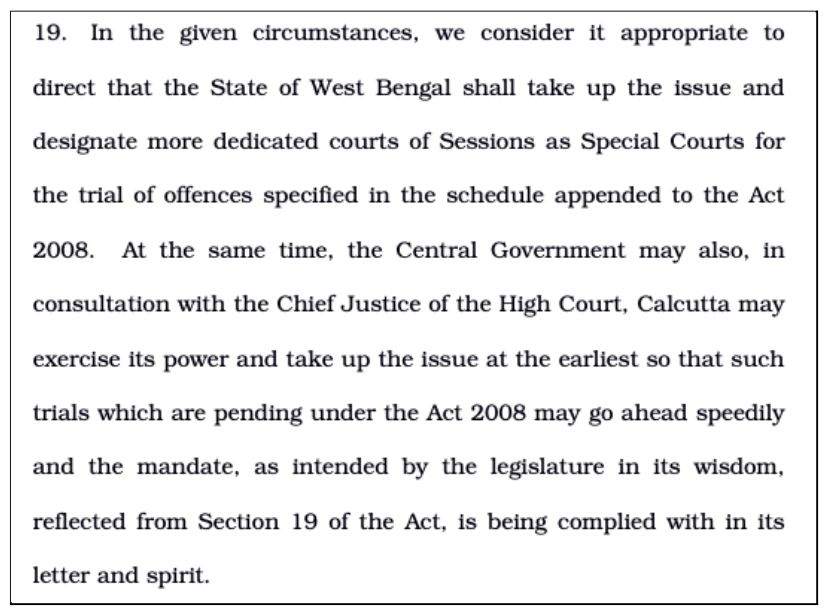
Therefore, the bench concluded that deprivation of personal liberty without ensuring speedy trial is not consistent with Article 21 of the Constitution of India. While deprivation of personal liberty for some period may not be avoidable, a period of deprivation pending trial/appeal cannot be unduly long.
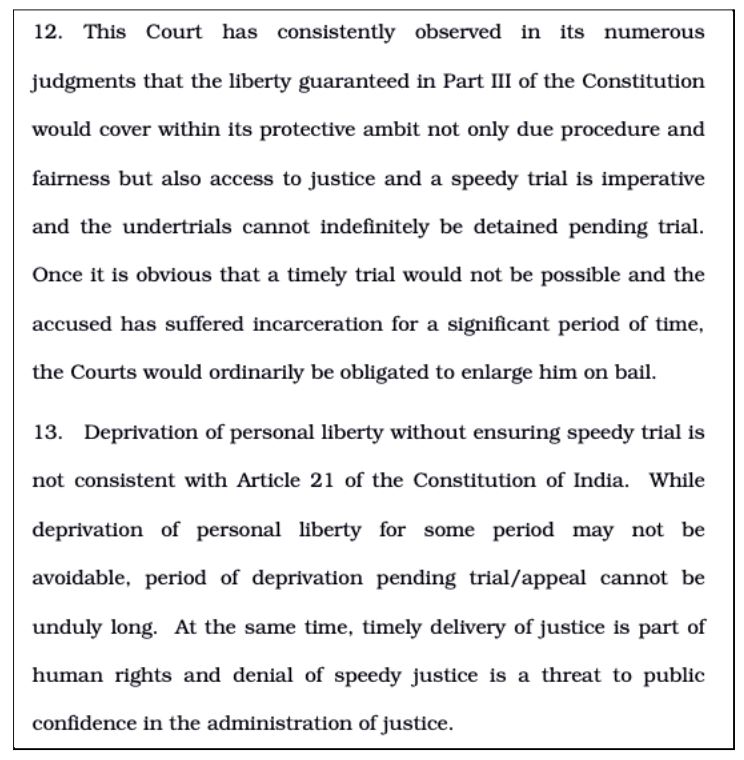
The appeal was allowed, and the judgment and order of the High Court was set aside, to pave way for the release of the accused on bail.
Supreme Court: Claim of juvenility can be raised before any Court, at any stage, even after final disposal of the case.
In the case Ashok vs. State of Madhya Pradesh, the Supreme Court observed that the claim of juvenility can be raised before any Court, at any stage, even after final disposal of the case.
The apex court was hearing an appeal filed by an aggrieved petitioner challenging his conviction and sentence, claiming juvenility at the time of the commission of the offence. On 29 July 1999, the Additional Sessions Judge convicted the petitioner under Section 302 IPC and had sentenced him to life imprisonment with regards to an incident that took place on 26 July 1997. In the cause title of the said judgment and order, the petitioner was addressed as Ashok, s/o Balram Jatab age 16 yrs 9 months and 19 days.
However, the petitioner filed a Criminal Appeal challenging this conviction, claiming that the petitioner was born on 5 January 1981 and was, therefore, approximately 16 years and 7 months old on the date of the incident. The Counsel for State argued that the claim of juvenility was raised for the first time in the Special Leave Petition.
The bench of Justices Indira Banerjee and JK Maheshwari held that if the Court finds a person to be a juvenile on the date of commission of the offence, it is to forward the juvenile to the Juvenile Justice Board for passing appropriate orders. Any sentence or order passed by a Court shall be deemed to have no effect.
Additionally, the bench also emphasised that the claim of juvenility can be raised before any Court, at any stage, even after the final disposal of the case.
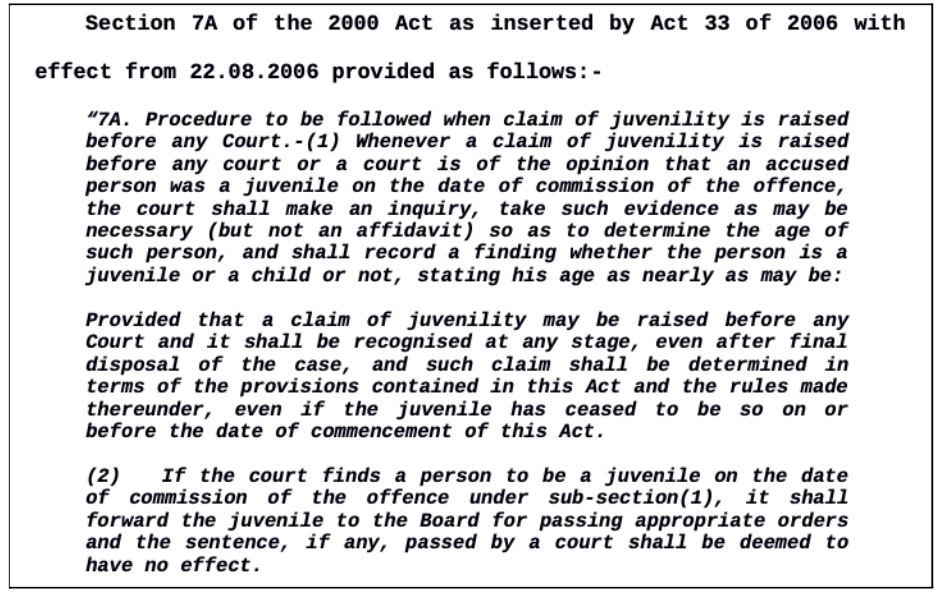
The apex court noted that the birth certificate issued by the Gram Panchayat, Endouri, District Bhind, Madhya Pradesh indicates the date of birth of the petitioner as 05 January 1982, and not 01 January 1982, as recorded in the school certificate, which was referred to earlier. The bench also notes that the entry in the records of the Gram Panchayat Endouri does not appear to be contemporaneous and the certificate was issued in the year 2017.
Therefore, the apex court directed the Sessions Court to examine the claim of the petitioner to juvenility in accordance with law and submit a report to the Supreme Court within one month.
Supreme Court: Persons with Disabilities should not be asked to remove prosthetic limbs at airport security checks.
In the case Jeeja Ghosh vs. Union of India, the Supreme Court observed that Persons with Disabilities (PwDs) with prosthetic limbs/calipers should not be asked to remove the prosthetics at airport security checks so as to maintain human dignity.
The apex court was following up on a petition filed in 2012 by Jeeja Ghosh, a disability rights activist, who was forcibly de-boarded from a SpiceJet flight due to her disability. In 2016, the Supreme Court had SpiceJet pay 10 lakhs as compensation for violating the petitioner’s right to dignity. Further, the Supreme Court issued a slew of directions to the Directorate General of Civil Aviation (DGCA) to modify its guidelines to ensure the dignity of PwDs during air travel.
On 2 July 2021, the DGCA came up with a new draft Guidelines ‘Carriage by Air of Persons with Disability and/or Persons with Reduced Mobility’. The draft guidelines mentioned the scanning of prosthetic limbs/calipers through a full-body scanner. The Senior Advocate, representing the petitioner, raised multiple objections to the draft guidelines. As part of the follow-up, the Supreme Court considered the subsequent guidelines framed by the DGCA in this regard.
The Bench of Justice Hemant Gupta and Justice V Ramasubramanian has granted liberty to the petitioners to submit their suggestions and objections to the Ministry of Civil Aviation regarding the revised draft Civil Aviation Requirements (CAR) guidelines within 30 days. The bench also expressed hope that the Ministry of Civil Aviation will consider such suggestions and objections even if the time limit for submission of the suggestions has come to an end.
In addition to the above direction, the bench also made two crucial observations:
- No PwD should be manually lifted without his consent. Lifting of a person manually is inhumane.
- The security checks at airports should be done in such a manner that no disabled person is required to remove the prosthetic limbs/calipers.
Supreme Court: Right Against Sexual Harassment part of Right to Life & Dignity under Article 21.
In the case Union of India and Ors vs. Mudrika Singh, the Supreme Court observed that the right against sexual harassment is vested in all persons as a part of their right to life and right to dignity under Article 21 of the Constitution. In the same vein, the Supreme Court stressed that it is important that the spirit of this right is upheld instead of rejecting sexual harassment complaints on “hyper-technical” grounds.
In the present case, the complainant is a constable at the Border Security Force (BSF), who had lodged a complaint against the head constable (his superior) under the Sexual Harassment of Women at Workplace (Prevention, Prohibition, and Redressal) Act, 2013. The Calcutta High Court had quashed disciplinary proceedings against the accused and had reinstated him to his initial position in the BSF.
Going through the High Court’s order and case details, the Supreme Court observed that the alleged discrepancy regarding the date of occurrence was of a minor nature since the event occurred soon after midnight and on the next day.
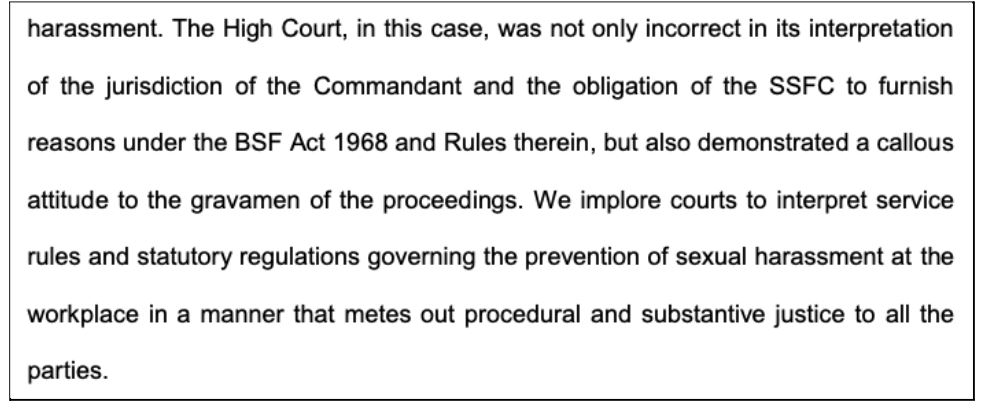
The bench of Justices D.Y Chandrachud and A.S Bopanna emphasised that it is important that Courts uphold the spirit of the right against sexual harassment. In this view, it becomes imperative to interpret service rules and statutory regulations governing the prevention of sexual harassment at the workplace in a manner that metes out procedural and substantive justice to all the parties.
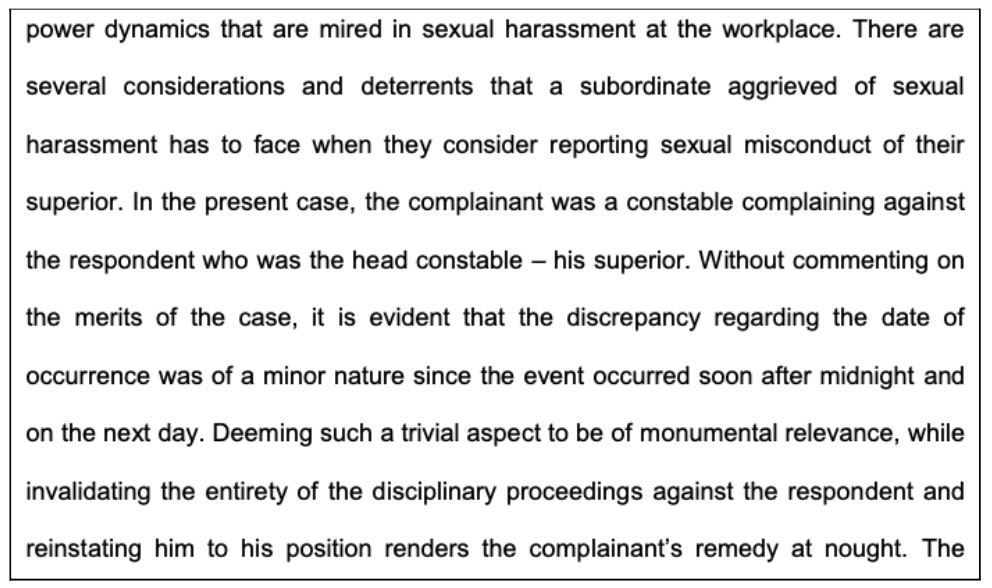
In conclusion, the appeal was allowed, and the order of the Calcutta High Court was set aside.
Featured Image: Important Court Decisions


